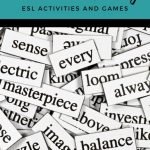
Teaching English without a textbook
I remember years ago when I was just starting out as a teacher, I felt like I NEEDED a textbook, because without it, what could I possibly do in class to fill the time? And I was indeed just filling the time and not really teaching. It seemed so complicated to have to figure out what the students needed and were interested in and then design my own materials to meet those needs.
But, as I’ve become a more experienced teacher, the less I’ve relied upon textbooks and if given a choice, there’s probably a 50-50 chance of whether I’ll use a textbook for a given class or not.
No textbooks: it really is possible! Try it for yourself and see.
No Textbooks for Teaching English?
I remember a presentation I attended at a Kotesol conference about teaching English without a textbook. Prior to that point in time, I’d been a slave to the textbook and felt nervous about not using one.
During this presentation, my mind was blown. What is this radical new way of teaching?! And I remember thinking how freeing it would be to do this in some of my own classes. So, I tried it out.
What is Dogme Language Teaching?
The official name for teaching without a textbook is “Dogme ELT.” Here is the definition from Wikipedia:
“Dogme is a communicative approach to language teaching that encourages teaching without published textbooks and focuses instead on conversational communication among learners and teacher. It has its roots in an article by the language education author, Scott Thornbury.”
Let’s get to how I practically apply this in my own classes at a Korean university.
I Use a Textbook in the Following Situations:
There are a number of cases when I’ll use a textbook in my classes including if I don’t really know the subject, for a content class, and if I’m required to.
I’m inexperienced in teaching the subject matter
One semester, I was given 3 sections of advanced academic writing. Although I’ve taught writing before, I’ve never gone this in depth with it. It would have been a struggle to come up with enough solid content in an organized fashion to really help my students. I ended up using the Great Writing Series, which I really liked and would use again a heartbeat.
Another time, I was given a presentation and public speaking class to teach for the first time. I was certainly not an expert in this area. It would have been really hard without the fabulous Speaking of Speech. As it was, it ended up being on my favourite classes of all-time!
In these cases, I found excellent textbooks that I enjoyed teaching from, and that the students liked as well. I still planned some other activities to do, but I found it useful to have something to fall back on.
It’s a content-based class
For example, if I were teaching an introduction to psychology class in English, I for sure would use a textbook of some kind. There’s just too much content to not do this.
You could probably get away with finding “readings” each week, but you’d end up spending a considerable amount of time doing this. Save yourself a headache and get something already organized into a coherent fashion!
If forced to
Most universities in Korea have some sort of mandatory textbook that they require you to at least pretend to use. The students have to buy it, so if you don’t use it at least a little bit for each class they’ll feel like they wasted their money (for good reason). They’ll also be quite unhappy with you, which can mean low evaluations.
If I liked the textbook (and the students did too), I’d use it a lot. If I didn’t, I’d usually stick with the vocabulary/grammar sections and then supplement it with my own more interesting practice activities (especially the free practice). Or, I might take a reading or listening passage from the book and base my own lesson plan on this.
It’s an exam preparation class, such as TOIEC speaking
It’s just too time consuming to come up with enough practice questions on your own, although there are some decent resources on the Internet. Plus, there’s also the problem that I’m not really an expert in these kinds of exam preparation classes. I know the basics, but people who really know what they’re doing have written the books, so why not take advantage of that?
No Textbooks in these Situations
There are also plenty of reasons to avoid textbooks. Here are some of the most common situations in which I’ll opt not to use one.
A conversation class
I find it more interesting and useful to design lessons around themes of some sort, mostly what I personally find interesting. A structurally based syllabus, upon which many textbooks are based is bad news in my opinion and it’s kind of the old style of language teaching.
I’m all about teaching in a more communicative, task-based way. For examples of activities, I would do in a conversation class, check out ESL Speaking or 39 No-Prep/Low-Prep ESL Speaking Activities: For Teenagers and Adults
It’s easier than you might think to plan your own lesson as well:
With advanced level students
Authentic materials, for example, real newspaper articles or YouTube videos are better for these students than stuff from a textbook. Once you get to a certain point, it’s all about real-life. Here’s a lesson plan that I based on authentic materials: Youth Unemployment in Korea.
A current events or contemporary issue class
It doesn’t make sense to use a textbook for this. It’s more interesting are far more relevant to talk about stuff that’s in the news today.
For more details about this topic, check out Teaching Unplugged by Scott Thornbury, which is the first (and only?) book to deal comprehensively with Dogme ELT.
Here’s an example of a lesson plan I might use for this situation: TV ESL Conversation Lesson Plan.
What Do You Think about Using No Textbook for ESL/EFL Classes?
Are there specific situations where you use a textbook and then others where you don’t? Leave a comment below and let us know your thoughts.
Also be sure to give this article a share on Facebook, Pinterest, or Twitter. It’ll help other teachers, like yourself, find this useful resource.




